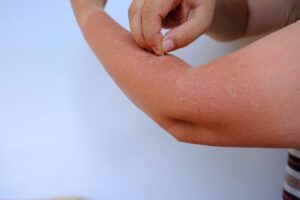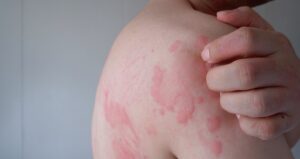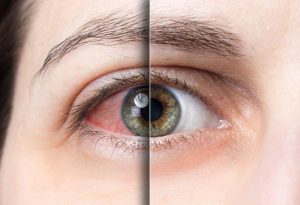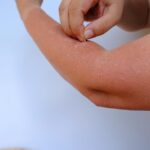You might have heard of the new COVID strain spreading rapidly in different countries – COVID JN1.
This variant is categorized inside the family of SARS-CoV-2 and is reported to have mutations in its structure that make it more transmissible than any other present strains.
In this blog, you’re about to unfold the facts about the rising COVID strain in 2024. Not only that, we have also mentioned some red flag symptoms of this variant and the precautions you can take to prevent the spread
Having said that, let’s dive deep and learn more about new variant of COVID JN1
How Is JN1 Different From The Other COVID Strains?
Although there’s not enough evidence but several authorities have reported that this latest variant has a mutation in one of its protein spikes. Due to this mutation, it can invade the immune system at a faster rate. Additionally, WHO has also confirmed that this variant can transmit more rapidly from person to person than other variants.
Therefore, during the winter, when other viruses such as Respiratory Syncytial Virus (RSV), COVID-19, and seasonal respiratory viruses are circulating, the addition of another variant, COVID-19 JN 1, is concerning for many people.
Despite the risk, authorities suggest that our immune system can still detect it, and antibodies can bind to the variant. Thus, every individual, especially those with weakened immune systems, needs to get an updated COVID vaccine to prevent the spread of JN1.
Cases Of JN 1 Reported Until 2024 In US
The Centers for Disease Control and Prevention reported that as of January 19, 2024, 85.7% of cases in the United States are estimated to be the new COVID variant JN1. Currently, no reports or evidence have been submitted regarding the severity of cases; however, WHO recommends staying safe and taking immediate action if you experience any concerning symptoms.
What Are The Symptoms Of New COVID Variant?
The symptoms of this new variant JN1 are very similar to the existing COVID variants and here’s a list of the symptoms that you might experience:
- Nasal congestion or runny nose
- Sore throat or cough (or both)
- Fatigue and body aches
- Fever or chills
- Diarrhea
- Loss of taste and smell (less frequent)
- Headache
The severity and the symptoms usually depend on your immunity and overall health. Therefore, if you notice any of these symptoms in yourself or any of your family members, you can visit a nearby urgent care clinic and get yourself tested for COVID.
How Will The Doctor Diagnose You?
Once you visit Family Urgent Care, experienced healthcare providers will evaluate your symptoms, overall health and risk factors like recent travel.
- COVID-Testing: The doctor might order a PCR test, antigen test or antibody test to detect the presence of the COVID variant. The type of test depends on your clinical condition and overall health status.
- Imaging: In some severe cases, the doctor orders imaging studies such as Chest X-rays or CT scans to assess lung involvement or monitor disease progression.
- Prescribe Medicines: Once the test results are obtained, the doctor prescribes medicines that will help you find relief and recover swiftly.
Safety Measures For People Suffering From JN1 COVID
If you or your loved ones experience any flu-like symptoms or you’re diagnosed with COVID JN1, you can take some steps to prevent severe infection and also reduce the risk of spreading the virus to the people nearby.
- Avoid going out by isolating yourself to help prevent the spread of infection
- Take naps and get ample amount of rest to help your body recover faster
- Take the prescribed medicines and consult your doctor if you do not see any improvement
- Keep yourself hydrated by increasing the amount of fluids, juices and water in a day.
- When coughing or sneezing, cover your mouth with a tissue, cloth or elbow.
- If you notice shortness of breath and have fever, persistent cough or diarrhea, contact the healthcare provider immediately.
How Long Does JN1 COVID Last?
The duration of infection due to JN1 is almost similar to other variants of COVID. Once JN1 enters your body, it might take 5 days for your symptoms to begin. People who have mild to moderate symptoms might fully recover within 2 to 12 weeks, depending on their clinical condition.
Is There A Need To Get An Updated Vaccine To Prevent COVID JN1?
COVID strains keep changing every year, therefore, healthcare experts and organizations around the world emphasize on getting an updated COVID vaccine that is expected to increase the protection against JN1 and other variants.
Even if you got a vaccine for COVID 19, the variants that are circulating nowadays are quite different. Therefore, getting new vaccines is necessary to boost your immune system.
Still confused about whether to get a shot or not? You can visit Family Urgent Care if you live in Indiana or Illinois and consult healthcare professionals on which vaccine would be best for you. We also have a built-in facility and trained staff to administer vaccines or flu shots as necessary.
Takeaway
All in all, the rise of COVID JN1, other variants, and seasonal respiratory viruses is concerning overall, especially in the winter season. But on the brighter side, you can take safety precautions and other steps to prevent the severity of the rising viral infections.
Not to mention, if you experience any concerning symptoms of COVID, cold or flu, you can consult our healthcare professionals right away!
Can’t visit the clinic due to hectic schedule? No worries! You can book same-day online phone or video appointments (telehealth) with our doctors and share your health concerns without any hassle from the comfort of your home or office.


























